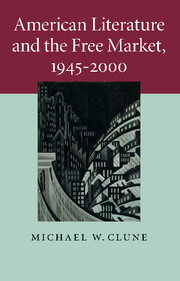Book contents
- Frontmatter
- Contents
- Acknowledgements
- List of abbreviations
- Introduction: The economic fiction
- 1 Freedom from you
- 2 Frank O'Hara and free choice
- 3 William Burroughs' virtual mind
- 4 Blood money: sovereignty and exchange in Kathy Acker
- 5 “You can't see me”: rap, money, and the first person
- Conclusion: The invisible world
- Notes
- Bibliography
- Index
3 - William Burroughs' virtual mind
Published online by Cambridge University Press: 23 February 2010
- Frontmatter
- Contents
- Acknowledgements
- List of abbreviations
- Introduction: The economic fiction
- 1 Freedom from you
- 2 Frank O'Hara and free choice
- 3 William Burroughs' virtual mind
- 4 Blood money: sovereignty and exchange in Kathy Acker
- 5 “You can't see me”: rap, money, and the first person
- Conclusion: The invisible world
- Notes
- Bibliography
- Index
Summary
“When you cut into the present the future leaks out. ”
–William S. BurroughsWhat are literary experiments? They are, like scientific experiments, repeatable and regularized. But can we speak here of success or failure? At the very least we can expect, both in the experimental text's tendency to thematize its processes, and in the theoretical texts that typically accompany it, accounts of the conditions that would have to obtain in order for the experiment to be successful. The literary experiment (and this is perhaps what makes it “literary”) has a virtual element. It shows us the kind of thing that would regularly happen if the world were different in some particular way. This appears to be especially true of those literary experiments that claim to be mimetic, to represent an aspect of everyday reality. These experiments show us ordinary artifacts suspended in imaginary laws; they show us the everyday processes of a world that manifests a principle of order that is not, or is not yet, recognizable in our own. William S. Burroughs' “cut-up” trilogy of the early 1960s is among the best-known and most influential of postwar experimental works. What happens in the virtual space of those novels has exerted a powerful attraction on the postwar imagination, but the principle of order defining that space remains to be articulated.
- Type
- Chapter
- Information
- American Literature and the Free Market, 1945–2000 , pp. 77 - 102Publisher: Cambridge University PressPrint publication year: 2009

